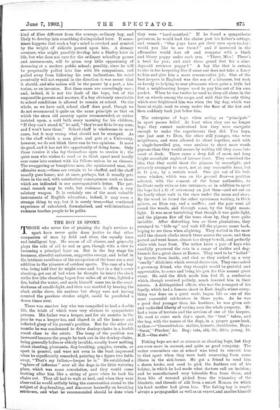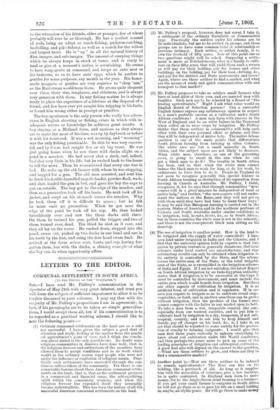THE BOY IN SPORT.
There was another boy who was compelled to lead a double life, the trials of which were very obvious to sympathetic persons. His father was a keeper, and for six months in the year he was a keeper too, and shared in all the honour and reflected glory of his parent's position. But for the other six months he was condemned to drive donkey-chairs in a health resort close to the estate. The irony of the position was increased because the people he took out in the donkey-chairs, being generally ladies or elderly invalids, usually knew nothing about shooting, pheasants, dog-breaking, puppies, vermin, or sport in general, and were not even in the least impressed when he significantly remarked, pointing to a figure two fields away, "That's my father,—keeper he is." He established a "sphere of influence" over all the dogs in the little watering place, which was some consolation, and they would come trotting after him like a string of geese when he took his chairs out. They all had to walk at heel, and when they were observed he would artfully bring the conversation round to the subject of dog-breaking, and discourse learnedly on breaking retrievers, and-what he recommended should be done when they were " hard-mouthed." If he found a sympathetic patroness, he would lead the chaise past his father's cottage, and remark : " Our pups have got their eyes open to-day ; would you like to see them ? " and if answered in the affirmative would dart off and reappear with a black and bleary puppy under each arm. " There, Miss There's a head for you ; and ain't them grand feet for a nine- days-old retriever puppy ? " A boy like that is certain to rise in the keepering line if some one does not take a fancy to him and give him a more remunerative job. One of the best keepers in England was the son of a labourer, but took so keenly to helping to rear pheasants when quite a little lad that a neighbouring keeper used to pay him out of his own pocket. When he was twelve be used to sleep all alone in the but on wheels among the coops, and said that the only thing which ever frightened him was when the big dog, which was loose at night, used to creep under the floor of the but and then suddenly bark just below him.
The enterprise of boys when acting as " principals " in sport passes belief. At least when they are no longer boys they cannot understand bow they were energetic enough to make the experiments they did. Two boys, one just sent to Eton, the other still younger, who were neighbours, and were allowed to shoot together, each with a single-barrelled gun, were anxious to shoot more wood- pigeons than they would secure by waiting till they came into roost at dusk. There came a deep fall of snow, and long bright moonlight nights of intense frost. They conceived the idea that they could shoot the pigeons by moonlight, and privately arranged to meet, not at any reasonable hour, but at 11 p.m., by a certain wood. One got out of his bed- room window, which was on the ground floor—a position selected, with the consent of the home authorities, to facilitate early exits or late entrances, as in addition to sport the boys bad a fit of astronomy on just then—and set out on his lonely silent walk in the snow under the moon and stars. By the wood he found the other sportsman waiting, in thick gaiters, an Eton cap, and a muffler; and the pair went all round the woods, and through some, by the bright moon- light. It was most tantalising that though it was quite light, and the pigeons flew off the trees close by, they were quite invisible. After disturbing two or three plantations, they arranged to " hide up" and wait till the pigeons came back, hoping to see them when alighting. They waited in the snow until the church clocks struck three across the snow, and then parted and went home, almost too sleepy to walk, and perfectly white with hoar frost. The writer knew a pair of boys who carefully preserved the rats in a range of stables and dog- kennels for a great shoot at Easter. They used to be " bolted " by ferrets from inside, and shot as they rushed up a very "smelly" ditch into which several drains ran. They once asked a grown-up friend, who they thought would be grateful and appreciative, to come and bring his gun for this annual great event. He said the ditch made him feel ill, a confession which, though received politely, much lowered him in their esteem. A distinguished officer, who was the youngest of his family, which had a famous shoot in East Anglia where every- thing was done on a great scale, began life as one of the most successful rat-hunters in those parts. As be was a good deal younger than his brothers, he was given sole and undivided liberty of ratting over the whole property. He had a team of terriers and the services of one of the keepers. He used to enter each day's sport, the " beat " taken, and the bag, with the names of the dogs, in a proper game-book, as thus:—" Ground taken: stables, kennels, shrubberies. Dogs: `Smut,' Pincher,' &c. Bag : rats, old, 30; ditto, young, 10. N.B.—One stote."
Fishing boys are not so common as shooting boys, but they are even more in earnest, and quite as good company. The writer remembers one at school who tried to convert him to that sport when they were both recovering from some illness in the sick-house. He got a friend to send him a dozen hooks, and used to pick the feathers out of his bolster, in which he had made what doctors call an incision ; and he manufactured very tolerable flies from them, and from bits of worsted picked from the trimming of the blankets, and threads of silk from a smart Roman tie which his fond mother had given him. The fishing boy is nearly always a propagandist as well as an expert, and applies himself
to the education of his friends, older or younger, few of whom probably will ever be as thorough. He has a perfect arsenal of rods, being an adept at roach-fishing, gudgeon-catching, barbelling, and pike-fishing, as well as a match for the wiliest and largest trout. He is " up " in all the natural history of flies, imagos, and sub-imagos. The amount of creeping things which he always keeps in stock at home, and is ready to lend or give at a moment's notice, is astonishing. He seems to have wasp-grubs at command, and keeps an ants' nest m his bedroom, so as to have ants' eggs, which he prefers to gentles for some purposes, any month in the year. His home- made maggots or gentles are very superior to "shop 'uns," as the Butterman would term them. He grows quite eloquent over these, their size, toughness, and shininess, and is always very generous with them. In any fishing matter he is always ready to place the experience of a lifetime at the disposal of a friend, and few have ever yet caught him tripping in his facts, or found him wrong either in precept or practice.
The boy-sportsman is the only person who really has adven- tures in English shooting or fishing, crises in which with in- adequate means or knowledge he achieves great results. A boy staying at a Midland farm, and anxious as they always are to make the most of his time, was up by daybreak or before it with his trout-rod. It was a wet morning, and "worming " was the only fishing practicable. In this he was very success- ful, and by 6 a.m had caught five or six big trout. He was just going home when he saw three wild ducks alight on a pond in a meadow. He had never shot a duck, and, indeed, had shot very little in his life, but he rushed back to the house to tell the news. Then he remembered that every one was in led. He woke up the old farmer with whom he was stopping, and begged for a gun. The old man assented, and sent him to fetch his double-barrelled muzzle-loader, powder-flask, wads, and shot, loaded the gun in bed, and gave the boy the caps to put on outside. The boy got to the edge of the meadow, and then as a precaution took off his boots. He next took off his jacket, and crept on his stomach across the meadow. Why he took them off it is difficult to guess ; but he felt he must omit no precaution. When he got near the edge of the pond he took off his cap. He then looked breathlessly over and saw the three ducks still there. On them he trained his gun, pulled the trigger, and two a them turned over, dead. The third he shot as it rose, and they all lay on the water. He rushed down, stepped into the pond, swam out, picked up two ducks in one hand and one in his teeth by the feet, and using the free hand swam back. He arrived at the farm minus coat, boots, and cap, having for- gotten them, but with the ducks, a shining example of what the boy can do when opportunity offers.







































 Previous page
Previous page